Twenty-one Octobers ago, I was a college student hovering over one of life’s many threshold moments, poised between what seemed at the time like teenager-hood on one side…and the yawning gap of “adulting” beyond. It was fall of my junior year at the University of South Carolina (yes, Go Gamecocks and especially their women’s basketball team, but I digress).
Beginning my fifth semester of college, I found myself right at that halfway moment in college where things start to seem more real and people begin to ask you a little more about what you might actually do after graduation. And I….I did not feel like myself at all. I felt like I was trudging through molasses. Everything seemed foggy and gray, as though I was peering through a grimy, smudged window at other people, who cheerfully and purposefully strode through sunlit spaces, while I remained ineluctably apart, unable to access them or the bright clarity they so appeared to possess.
In hindsight, I know I was struggling with a depressive episode, but I didn’t have language for that at the time because I’d never walked through that before. So it just felt like something had gone terribly wrong. Tired and unmotivated, I abruptly pulled out of the many extracurricular activities I had been industriously undertaking–from our version of an ambassador in admissions (including being one of six who helped host fancy gatherings at the university president’s house) to a res hall council member and community volunteer. I decided that I needed to pull back on my ambitious coursework as well. As an honors student double-majoring in English and Spanish, I hoped to possibly attend graduate school for literature one day, and so I determined that I needed a breather. Maybe, I mused, I could scale back on a course or two that wasn’t as essential for my still-developing doctoral plans.
That term I was enrolled in a fascinating honors seminar on pre-1800s African history, a subject about which I knew embarrassingly little. I didn’t fully appreciate how fascinating this class was, however, because at that moment I lacked the capacity for true awe or wonder. To this day, I can still vividly recall the course’s kindly and erudite professor who, prior to his Peace Corps service in Uganda and graduate work, had graduated from Kalamazoo College. As a twenty year-old South Carolinian, I had no idea where Kalamazoo was; it sounded as faraway to me as the many centuries-removed history I was attempting to puzzle out.
I visited Dr. Atkinson’s office hours because I had resolved to switch from the honors seminar version of this class to a lecture-based version, with less intensive reading assignments and less corresponding projects. I would still learn the material, I reasoned, but without as many additional requirements. Stepping into his office out of polite obligation (in my estimation anyway), I certainly didn’t want him to think I didn’t like his course. I thought it my duty to inform him of my change in plans so he would not be surprised when I moved from one roster to another on his teaching schedule.
I still remember how he peered at me through his glasses as I dutifully stood before him, reciting my plan. He smiled softly and asked me to sit down. How was I doing? What did I think about the book we’d been reading? What else was I taking that semester, and why had I chosen his class in the first place?
It all came tumbling out. Or, at least, some of it did.
Gently and with the care of a seasoned mentor, Dr. Atkinson encouraged me to stay–and not, I should hasten to add, because I needed to prove myself as some sort of exceptional college student or as someone who could not slow down and take a breath. (As a former academic advisor now myself, let me just reiterate: quadruple-majoring remains a bad idea! You do not need to do ALL. THE. THINGS.)
All these years later, I better recognize what he was up to that day. I think he intuited that what I actually, desperately needed was to relax my death-grip on the idea of who I was supposed to be–someone who never made less than an A, a perfectionist with a logical plan for academic and career success.
Drawing me out in conversation, Dr. Atkinson encouraged me to stay in the class, not because I should but because it would be an opportunity to lean into curiosity. Indeed, the same sort of curiosity that propelled me toward exploring and analyzing themes and patterns in literature could find an outlet in these ancient primary documents. What patterns might I discover in the cultural traces of these historical texts? What stories were they telling beneath the lineages and lists? Why did it matter?
Ultimately, this proved (almost) invitation enough. Truth be told, I’m sure some part of my decision to stick it out in his seminar was rooted in a fear of disappointing him. But another part of my decision stemmed from his ability to see through my facade to the heart of the matter. What I needed wasn’t a plan to open up my schedule…so that I could probably push myself that much harder in literature seminars. What I needed was a release, a reminder of why any of this complex humanities work spoke to me and resonated so powerfully in the first place. I needed to reconnect with creativity and curiosity, and, perhaps slowly, with myself and a world blessedly bigger than me.
I’m sharing this story today after giving a version of it several weeks ago for Morning Prayer. I am so grateful to Pastor Jim and my colleagues in Calling & Spiritual Life for settling on this year’s Monday Morning Prayer theme as “That Time I Asked for Help.” On the surface, it seems like a strange theme–certainly not the sort I remember my pastors growing up might have organized a sermon series around–but it makes a lot of sense on our college campus, where we’re all (whether students or not) learning and growing and challenging ourselves and falling short and getting back up and reflecting and learning anew.
That’s the essential work of education after all, but it’s also the essential work of being human. We just need reminders from time to time, and sometimes those reminders are grace-filled encounters when we admit we need someone else’s perspective or guidance. Other times (and often in my own experience), someone else perceives the heart of the matter, gently offering up the support you didn’t realize, let alone begin to articulate, that you needed.
That is grace, and that is a gift, if we can only be wise enough to humbly receive it.
–Dr. Anna Stewart, Director of the Institute for Leadership and Service
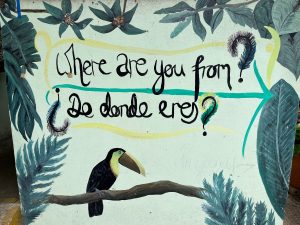 I would like to invite you into a journaling activity this week. We at the Institute for Leadership and Service like to promote reflection. We think of it as a muscle we can exercise. You know, how strong muscles are just kind of “nice to have” until one day when you need to move a couch or pick up a child, and then those muscles become absolutely necessary. Similarly, reflection may seem superfluous, until the day we kind of just need to know what we think about a subject.
I would like to invite you into a journaling activity this week. We at the Institute for Leadership and Service like to promote reflection. We think of it as a muscle we can exercise. You know, how strong muscles are just kind of “nice to have” until one day when you need to move a couch or pick up a child, and then those muscles become absolutely necessary. Similarly, reflection may seem superfluous, until the day we kind of just need to know what we think about a subject.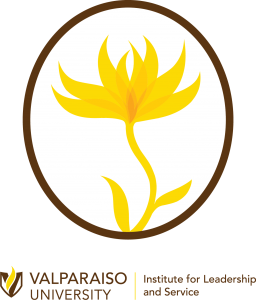 Over the course of this summer and my internship at Erie House, one thing has became ever more clear to me each time I wake up and head to work: any number of individually insignificant factors can decide whether or not it’ll feel like a good day. For example, it could be cloudy but not raining, my bus is on time, and I have an extra minute to grab coffee before I clock in. That’s already a good day. Just as much, if it’s raining without an umbrella, both of my bus rides get delayed, and I have to show up twenty minutes late, that’s kind of a rough start.
Over the course of this summer and my internship at Erie House, one thing has became ever more clear to me each time I wake up and head to work: any number of individually insignificant factors can decide whether or not it’ll feel like a good day. For example, it could be cloudy but not raining, my bus is on time, and I have an extra minute to grab coffee before I clock in. That’s already a good day. Just as much, if it’s raining without an umbrella, both of my bus rides get delayed, and I have to show up twenty minutes late, that’s kind of a rough start.
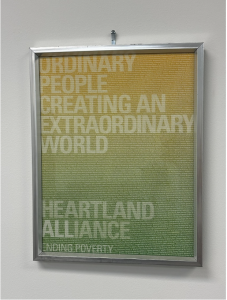 Today is my last day of my CAPS summer fellowship at Heartland Alliance. I look around the office. It’s quiet, a normal Friday morning as people mostly elect to work remotely before the weekend. Regardless, while everyone goes about their day, I sit here reflecting on some of the things I have learned this summer about both the work I have gotten to be a part of in refugee resettlement and as part of a non-profit at large in Chicago, IL.
Today is my last day of my CAPS summer fellowship at Heartland Alliance. I look around the office. It’s quiet, a normal Friday morning as people mostly elect to work remotely before the weekend. Regardless, while everyone goes about their day, I sit here reflecting on some of the things I have learned this summer about both the work I have gotten to be a part of in refugee resettlement and as part of a non-profit at large in Chicago, IL.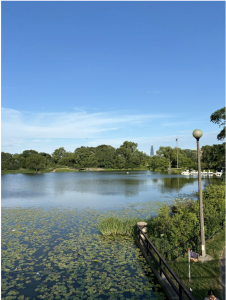
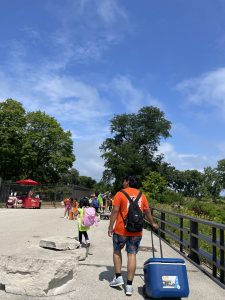 ‘I don’t know.’: the response that never feels good enough. Whether it is an answer to what you want, why you started, or what you plan for the future, few leave a conversation satisfied when you say ‘I don’t know’. But I, personally, don’t know a lot of things. I am a very indecisive person; I like to do a lot of things, and I don’t mind doing a lot of things, so, while some people might call me a people pleaser, I would say I’m just really adaptable. I want what others want because I would be content with either.
‘I don’t know.’: the response that never feels good enough. Whether it is an answer to what you want, why you started, or what you plan for the future, few leave a conversation satisfied when you say ‘I don’t know’. But I, personally, don’t know a lot of things. I am a very indecisive person; I like to do a lot of things, and I don’t mind doing a lot of things, so, while some people might call me a people pleaser, I would say I’m just really adaptable. I want what others want because I would be content with either.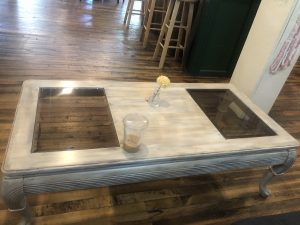 A lot of people think that I am a shy person. But really, I am just an anxious person, and that results in me thinking and rethinking through any possible implications and consequences of any actions or words before doing or saying them. And when I do not pre-think through them, I will post-think through them afterwards. Or both, which can really slow an interaction. Shockingly enough, that kind of hesitation comes across as shy.
A lot of people think that I am a shy person. But really, I am just an anxious person, and that results in me thinking and rethinking through any possible implications and consequences of any actions or words before doing or saying them. And when I do not pre-think through them, I will post-think through them afterwards. Or both, which can really slow an interaction. Shockingly enough, that kind of hesitation comes across as shy.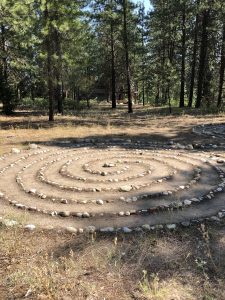 Just like at Valpo, the Grünewald Guild has a walking labyrinth outside, just beyond their central building and right next to the river. Anyone can use it at any point of the day, or night even. I actually heard from someone that they went out to walk it at night and stargaze. We use it during our final Vespers service of each program week too; to meditate on all the things we’ve learned from the week, to center ourselves and find a few minutes of peace and quiet inside our busy bodies.
Just like at Valpo, the Grünewald Guild has a walking labyrinth outside, just beyond their central building and right next to the river. Anyone can use it at any point of the day, or night even. I actually heard from someone that they went out to walk it at night and stargaze. We use it during our final Vespers service of each program week too; to meditate on all the things we’ve learned from the week, to center ourselves and find a few minutes of peace and quiet inside our busy bodies.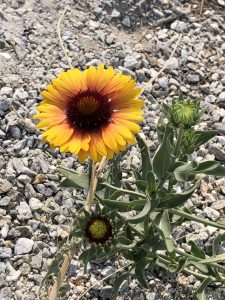 As I’m finishing out my internship here at the Guild with only one week left, I’m looking back on the memories I’ve made with the people and the land around me. Some experiences have opened new doors for me that I’d like to keep open as I come back to Valpo. Others have shown me interesting perspectives and walks of life that add to my understanding of the world and how I engage with it. I think I’ll be visiting our labyrinth at Valpo a lot more often next year.
As I’m finishing out my internship here at the Guild with only one week left, I’m looking back on the memories I’ve made with the people and the land around me. Some experiences have opened new doors for me that I’d like to keep open as I come back to Valpo. Others have shown me interesting perspectives and walks of life that add to my understanding of the world and how I engage with it. I think I’ll be visiting our labyrinth at Valpo a lot more often next year.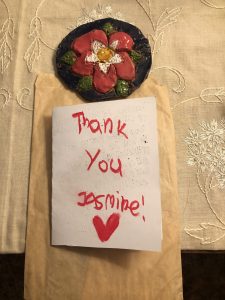 As of late July, I have served as a Communications Intern at Grünewald Guild in Leavenworth, WA for two months as part of my placement as a member of the CAPS Fellows Program. Through working in this position, I have exponentially grown to further refine my vision for my vocation as I approach the final year of my academic career at Valparaiso University. The mission of the guild is highlighted through the three core values of art, faith, and community and, since I am a Music and English major, I initially thought I would gravitate my attention mostly towards the value of art during my time here. Surprisingly, that was not that case and I started to primarily focus upon the aspect of community involvement and how it uniquely manifests itself at this non-profit organization. By nature, I have more of an introverted demeanor and it often takes me a bit of time to feel comfortable with expressing myself in a new environment. Interestingly enough, I did not feel as timid as I typically do during a transitional period of my life, and I think that lack of apprehension I felt is due to the Guild deliberately being a welcoming and community-oriented environment by its very design.
As of late July, I have served as a Communications Intern at Grünewald Guild in Leavenworth, WA for two months as part of my placement as a member of the CAPS Fellows Program. Through working in this position, I have exponentially grown to further refine my vision for my vocation as I approach the final year of my academic career at Valparaiso University. The mission of the guild is highlighted through the three core values of art, faith, and community and, since I am a Music and English major, I initially thought I would gravitate my attention mostly towards the value of art during my time here. Surprisingly, that was not that case and I started to primarily focus upon the aspect of community involvement and how it uniquely manifests itself at this non-profit organization. By nature, I have more of an introverted demeanor and it often takes me a bit of time to feel comfortable with expressing myself in a new environment. Interestingly enough, I did not feel as timid as I typically do during a transitional period of my life, and I think that lack of apprehension I felt is due to the Guild deliberately being a welcoming and community-oriented environment by its very design. 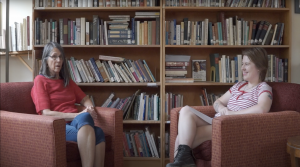
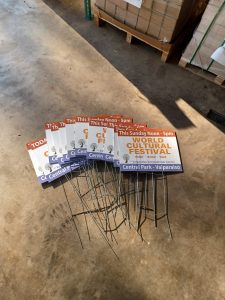 Reconnecting with my high school viola teacher after three years brought up her valid question of, “Any updates with what you want to do with your life?” When I replied, “Well, I want to apply for programs to study or teach in another country for a year… Then possibly grad school for something ‘international’…” we both had to pause and laugh; nothing had changed in the three years since we’d last talked. I still didn’t have a set plan.
Reconnecting with my high school viola teacher after three years brought up her valid question of, “Any updates with what you want to do with your life?” When I replied, “Well, I want to apply for programs to study or teach in another country for a year… Then possibly grad school for something ‘international’…” we both had to pause and laugh; nothing had changed in the three years since we’d last talked. I still didn’t have a set plan. As I near the end of my time at Jacob’s Ladder, I am once again given the chance to reflect on the different experiences and opportunities I have been given this summer. Among all the different opportunities that I have had at my placement, the ones that stick out the most to me are those where I could attend other meetings/events in the community. All of the events that I attended gave me the chance to meet new people, have meaningful discussions with others, and learn new information. These events helped me get out of my comfort zone and learn new information that I will carry with me far beyond my time at Jacob’s Ladder.
As I near the end of my time at Jacob’s Ladder, I am once again given the chance to reflect on the different experiences and opportunities I have been given this summer. Among all the different opportunities that I have had at my placement, the ones that stick out the most to me are those where I could attend other meetings/events in the community. All of the events that I attended gave me the chance to meet new people, have meaningful discussions with others, and learn new information. These events helped me get out of my comfort zone and learn new information that I will carry with me far beyond my time at Jacob’s Ladder. 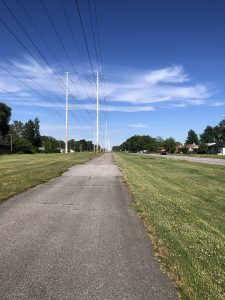 At the beginning of June, I moved to a town I had never visited, to live in a house I had never seen, and to work with people I had only spoken to over Zoom. My family dropped me off, and once I had all of my things arranged, I sat on the bed and had a strange but very familiar feeling wash over me: What do I do now? I had the whole night ahead of me, but everyone I know and everything I do was scattered everywhere but here. The empty span of time ahead of me felt dizzying. So, I just sat there in the what-now feeling, thinking. I began to think about why this feeling was so familiar to me, and I thought of all of the other transitions I have had like this throughout my whole life: from the five times I moved as a kid, to the move into college, to my trip studying abroad, I began to realize that this is all old hat to me. I have done this before, and sure enough, I have done this again.
At the beginning of June, I moved to a town I had never visited, to live in a house I had never seen, and to work with people I had only spoken to over Zoom. My family dropped me off, and once I had all of my things arranged, I sat on the bed and had a strange but very familiar feeling wash over me: What do I do now? I had the whole night ahead of me, but everyone I know and everything I do was scattered everywhere but here. The empty span of time ahead of me felt dizzying. So, I just sat there in the what-now feeling, thinking. I began to think about why this feeling was so familiar to me, and I thought of all of the other transitions I have had like this throughout my whole life: from the five times I moved as a kid, to the move into college, to my trip studying abroad, I began to realize that this is all old hat to me. I have done this before, and sure enough, I have done this again. 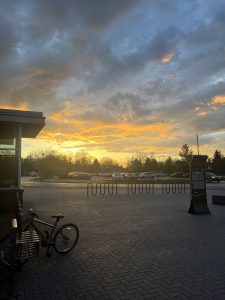 As my internship draws to a close, I’m faced with the same question that I begin the internship with. Why am I working with an environmental non-profit, what difference could I ever make?
As my internship draws to a close, I’m faced with the same question that I begin the internship with. Why am I working with an environmental non-profit, what difference could I ever make?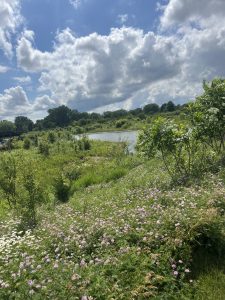
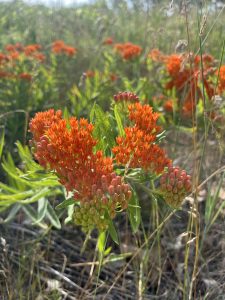 My opinions do matter, and it is possible to voice them loudly. Like a small rock making waves in a pond, a grass growing in the middle of a cracked sidewalk, a bee pollinating the vegetables in a neighborhood garden. My voice is not as small as I have been made to believe.
My opinions do matter, and it is possible to voice them loudly. Like a small rock making waves in a pond, a grass growing in the middle of a cracked sidewalk, a bee pollinating the vegetables in a neighborhood garden. My voice is not as small as I have been made to believe.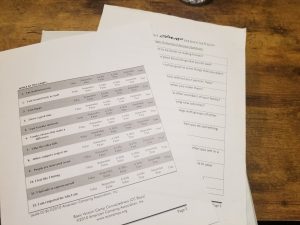 As I sit down to write this blog post, one realization crosses my mind. It is the realization that time keeps marching forward, and that is especially true when it comes to summer and my placement. As of the first week of July, I have officially hit the halfway mark of my duties serving Opportunity Enterprises and Camp Lakeside. The phrases “Time flies when you’re having fun” and “You never truly appreciate what you have until it’s gone” perfectly define and encompass what this experience has been. As I look back at what I have accomplished, a lot of it hasn’t felt as actual work. This is not only true for myself, but also for the campers and staff that I interact with on a daily basis. While much of my job is done behind the scenes, I also have many opportunities throughout the week to interact with campers in a way that I still fulfill my duties as a researcher for the camp and OE as a whole.
As I sit down to write this blog post, one realization crosses my mind. It is the realization that time keeps marching forward, and that is especially true when it comes to summer and my placement. As of the first week of July, I have officially hit the halfway mark of my duties serving Opportunity Enterprises and Camp Lakeside. The phrases “Time flies when you’re having fun” and “You never truly appreciate what you have until it’s gone” perfectly define and encompass what this experience has been. As I look back at what I have accomplished, a lot of it hasn’t felt as actual work. This is not only true for myself, but also for the campers and staff that I interact with on a daily basis. While much of my job is done behind the scenes, I also have many opportunities throughout the week to interact with campers in a way that I still fulfill my duties as a researcher for the camp and OE as a whole. 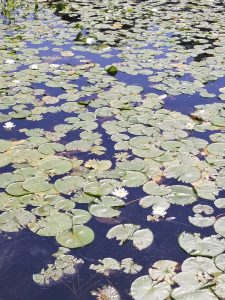
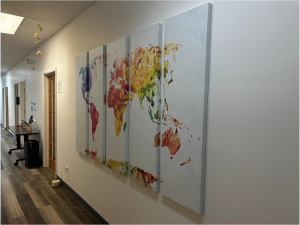 We often hear the phrase “don’t make excuses, make improvements”. For many, this may be a difficult thing to be told – this kind of statement misses and overlooks the individual nuances and circumstances of the situation we find ourselves in. But despite these challenges, we now find ourselves forced to continue on with no acknowledgement of them.
We often hear the phrase “don’t make excuses, make improvements”. For many, this may be a difficult thing to be told – this kind of statement misses and overlooks the individual nuances and circumstances of the situation we find ourselves in. But despite these challenges, we now find ourselves forced to continue on with no acknowledgement of them.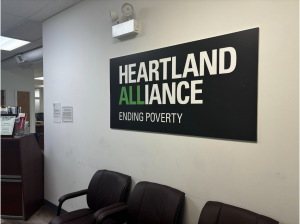 When I take a step back now and consider Heartland’s broader role in its community, it falls in some sense along the lines of this exact idea, providing solutions in all kinds of forms in housing, employment assistance, vocational English language training and even trauma assistance. The team here can only think in these terms (solutions, that is); when people’s livelihoods depend on you, you have no choice.
When I take a step back now and consider Heartland’s broader role in its community, it falls in some sense along the lines of this exact idea, providing solutions in all kinds of forms in housing, employment assistance, vocational English language training and even trauma assistance. The team here can only think in these terms (solutions, that is); when people’s livelihoods depend on you, you have no choice.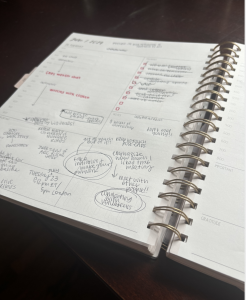 Now that I have over a month of my CAPS fellowship under my belt, it is easy to slip into a routine and let the day-to-day pass by quickly, and without much thought. May and June were a blur of emails back and forth, numerous to-do lists scribbled on Post-it notes, Zoom call meetings, and countless hours of staring at my computer screen. Don’t get me wrong, I am enjoying the work I’m doing and staying busy throughout the long summer days. I enjoy my lists and checking off projects as I complete them. But lately, a little voice in my head has reminded me of the importance of recognizing the small moments of purpose and slowing down before the summer comes to a close.
Now that I have over a month of my CAPS fellowship under my belt, it is easy to slip into a routine and let the day-to-day pass by quickly, and without much thought. May and June were a blur of emails back and forth, numerous to-do lists scribbled on Post-it notes, Zoom call meetings, and countless hours of staring at my computer screen. Don’t get me wrong, I am enjoying the work I’m doing and staying busy throughout the long summer days. I enjoy my lists and checking off projects as I complete them. But lately, a little voice in my head has reminded me of the importance of recognizing the small moments of purpose and slowing down before the summer comes to a close.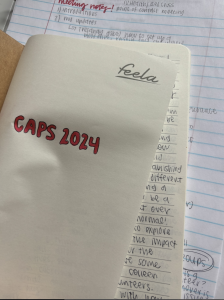
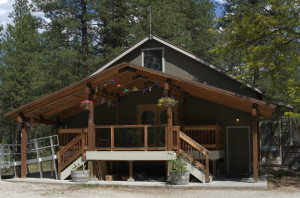 Curiosity killed the cat is a saying that I have heard throughout my child and young adult life. While it may be true in some situations, the age old saying takes away from what I believe to be one of humanities’ main functions, and that is to explore the unexplored.
Curiosity killed the cat is a saying that I have heard throughout my child and young adult life. While it may be true in some situations, the age old saying takes away from what I believe to be one of humanities’ main functions, and that is to explore the unexplored.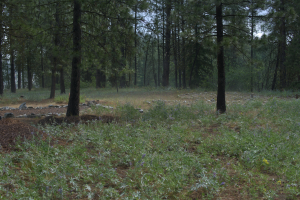
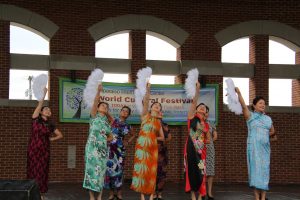
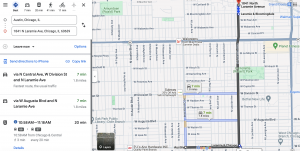 The easiest way to get to 1841 North Laramie Ave from Austin, Chicago by 10 AM every weekday without a car is to take the Green Line at Austin via Ashland/63rd, get off at Laramie & Lake, then take bus 57 towards Grand/Latrobe and get off at Laramie & Bloomingdale. In theory, this journey should only take about 33 minutes: a 5-minute walk to the station, a 12-minute train ride to Laramie & Lake, a 14-minute bus ride to Laramie & Bloomingdale, and a 2-minute walk north towards the building, meaning I could leave my house at 9:20 AM.
The easiest way to get to 1841 North Laramie Ave from Austin, Chicago by 10 AM every weekday without a car is to take the Green Line at Austin via Ashland/63rd, get off at Laramie & Lake, then take bus 57 towards Grand/Latrobe and get off at Laramie & Bloomingdale. In theory, this journey should only take about 33 minutes: a 5-minute walk to the station, a 12-minute train ride to Laramie & Lake, a 14-minute bus ride to Laramie & Bloomingdale, and a 2-minute walk north towards the building, meaning I could leave my house at 9:20 AM.